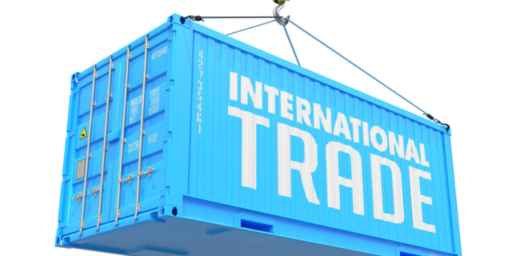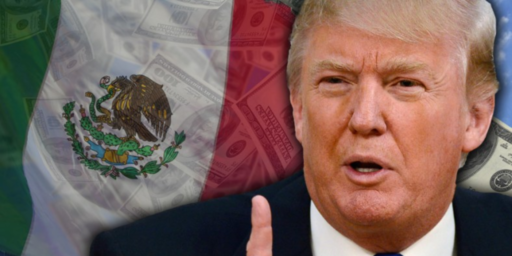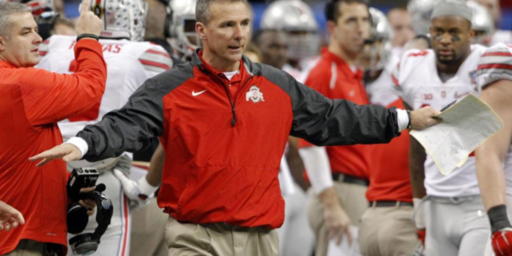Donald Trump’s Plan to Increase the Trade Deficit
Yet another example of why Trump and his views on Trade and the economy are contradictory and even incoherent. Not only should Trump be building his Great Trump Wall™ in Mexico he should be furiously working against any and all foreign investment in the U.S.
One of Trump’s campaign pledges was to increase spending on infrastructure by $1 trillion.
Despite a notoriously negative campaign on both sides, President Trump did propose a number of notable promises during the extended campaign that caught the eye of both domestic and foreign investors. In his pledge to “Make America Great Again,” Trump vowed to spend $1 trillion dollars updating and improving the aging U.S. infrastructure.
However, there is a bit a problem there. When foreign investor’s invest in the U.S. that typically increases the capital account surplus. And that means that the current account deficit also has to go up. That is, the current account and capital account must sum to zero. And since the current account goes by another name, i.e. the trade account, foreign investment will almost surely increase the trade deficit. Here is a “story” of how this can happen: Mr. Lee in Korea wants to invest $1 billion in the U.S. so he buys $1 billion from Mr. Smith in the U.S. Mr. Smith then goes and spends that money of Samsung televisions to sell in the U.S. The capital account goes up by $1 billion and the current account goes down by $1 billion. Since the capital account is in surplus the capital account surplus goes up, and since the current account is in deficit the trade deficit must also go up (in absolute value). One might argue about this, but it should be pointed out that these are accounting identities, that is they are true by definition. So while one could take exception to my story of how the current and capital accounts change given foreign investment the end results must be the same. The trade deficit goes up as does the capital account surplus.
To the extent that these investments are funded by foreigners this will lead to an increase in the trade deficit. This is not a bad thing though, unless your name is Donald J. Trump. Most people would see investment, by foreigners, in the U.S. as a good thing. That the U.S. is a good place to invest their money speaks well of their expectations for the future of the U.S. However, the increase in the trade deficit, according to Trump, must somehow result in a loss of American jobs. Even though the intuition is completely different. Foreign dollars leading to more firms, factories, or roads in the U.S. leads to…fewer jobs? We got a glimpse of this level of incoherence when Trump was gleefully tweeting about SoftBanks pledge to invest $50 billion in the U.S. That investment is supposed to result in 50,000 jobs. Even if this were true, according to Trumponomics there must be 50,000 jobs somewhere else in the economy or at least an equivalent value of jobs lost.
We can see the same problem with the border wall. Suppose some miracle happens and Mexico does decide to pay for Trumps Wall™. This would constitute foreign investment and increase the capital account surplus. Thus, the trade deficit must also increase (although not necessarily with Mexico). If Trump were not incoherent he’d insist on Americans paying for the wall and building it in Mexico (yes, with Mexican firms and workers) thereby decreasing our trade deficit and capital account surplus.
The bottom line is that Donald Trump’s position and public statements on trade and the economy are simply incoherent. The ramblings of an “abused” billionaire who used to live in a gilded penthouse in New York City.





Not to quibble, but $1 billion worth of what?
@HarvardLaw92:
Doesn’t really matter. Real estate, a business, pretty much any dollar denominated asset in the U.S.
@Steve Verdon:
It actually does matter, which is why I asked.
Trump doesn’t have any staff around who can write bills. He’s not going to have any plans besides EOs. Any legislation he signs will be 100% congressional staffers.
@HarvardLaw92:
No, it doesn’t. Not really. The only way it might matter on “what is bought” is “who it is bought from”. If Mr. Lee from Korea buys a business from Mrs. Krueger from Germany then there would be no change in the capital account as one foreigner has bought an American business from another foreigner. But then that wold not lead to more jobs like with the SoftBank deal.
In Econ 101, the balance of payments is zero.
In the real world, it isn’t. In practice, the US is a debtor nation (i.e. it has a negative balance of payments.)
Theoretically, infrastructure or other spending need not be funded through FDI. It could be funded domestically through tax increases, for example.
The real problem with Trump’s plan (assuming that it isn’t just talk) is that the timing sucks. The country is near full employment — a dramatic increase in employment would be inflationary, which means higher interest rates. So the average consumer would lose money on this deal because mortgage and credit card rates would rise in response to it.
It would help Trump’s cronies in the construction business at the expense of the dumb stiffs who voted for him. Oh, the irony…
This should have happened toward the end of Bush 43’s second term or during Obama’s first term, when unemployment was high and money was going to stay cheap.
Why do we want foreigners (or anyone) investing in our infrastructure?
Does anyone, anywhere actually find toll roads, toll bridges, privatized parking meters and privatized water systems less onerous than a modest increase in taxes? Interest rates are low, we can afford to directly borrow money, rather than go on an adventure in public-private partnerships that always manage to screw over everyone other than the private investors?
A $20 billion project in a $16 trillion dollar economy will have an impact on the trade deficit too small to be noticed, nor does anyone care about the absolute quantities in components of the trade deficit; they care about real outcomes. Those things make for far more effective arguments against Trump’s “Fortress America” notions.